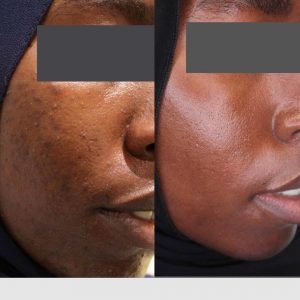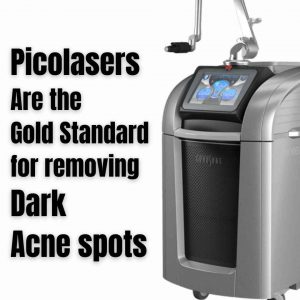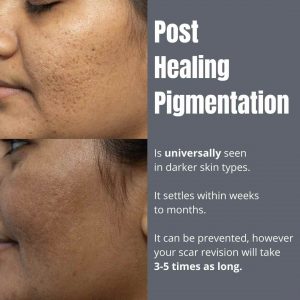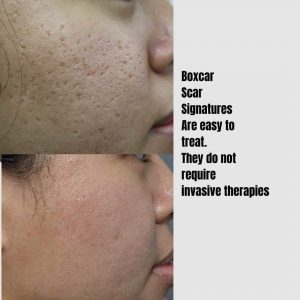Acne Treatments in ethnic skin at a glance
- Best Results4-16 weeks
- Treatment RecoveryNil
- Procedure TimeNA
- Skin SpecialistMedical dermatologist, nurse
- Duration of ResultsRemission in >60%
- AnaestheticNA
- Back to WorkNA
- Cost$
Acne Treatments in darker skin types
Acne treatment in darker skin types such as Asians & Middle Eastern patients are different compared to treating Caucasian acne. Darker skin types tend to scar more easily, and acne can be associated with skin changes, including darkening of the skin- also known as post-inflammatory hyperpigmentation. The dermatologists at Cutis Dermatology in Brisbane are experts in the management of acne in darker skin patients.
FactsFacts on Acne Treatments in darker skin types
- Acne scarring is more common in Asians & darker skin races
- Darkening of the skin is commonly with acne in these patients
- Early treatment of acne will prevent scarring and skin darkening
- Acne occurs in all races
- Darkening of the skin can be improved with lasers
- The use of sunscreen on a daily basis is very important and forms the basis of acne scar treatments in darker skin patients

What is the difference between Acne Treatments in darker skin patients?
Darker skin patients such as Asian or Middle Eastern have a harder time dealing with acne and acne scarring compared to Caucasian patients. There are several reasons why treating acne earlier and with more powerful medications may be appropriate.
Firstly, scarring can be more profound in Asian & ethnic patients, especially keloid scarring.
Secondly, colour changes such as darkening of the skin (post inflammatory hyperpigmentation) is more commonly seen with acne. If post inflammatory changes occur, it may take many months before it settles down. Prevention of scars & colour changes is very important.
Why is sunscreen use important in the management of acne in dark skin patients?

Sunscreen is especially important in the treatment of acne in darker skin types. UV exposure can stimulate pigmentation, known as post inflammatory hyperpigmentation. Dark acne scars can occur as a result. It is important to use a high factor non-greasy sunscreen on a daily basis, as part of your skin care treatment. Preventing scarring is very important.
The Specialist choice of sunscreen is La Roche Posay, as this provides maximal UV protection and is not acne forming. Another option is Invisible Zinc.
What treatments are available to treat acne in Asian and dark skin patients?

The same types of treatments apply to treating darker skin types as treating Caucasian patients. Depending on the severity of your acne, your specialist may elect to use creams, tablets, chemical peels, or prescription washes. We would always recommend that you use a sunscreen on a daily basis to prevent darkening of your acne lesions.
In some cases they may elected to use a higher-grade acne treatment such as Roaccutane to prevent scarring.
In more severe cases they may recommend treatments such as Tixel , Pico & vascular lasers to treat early acne scars.
What can be done for acne scarring in darker skin patients?

Treating acne scarring in darker skin patients can be difficult due to the risks of scarring & skin colour changes can occur. The treatments we perform are dependent on not only the type of acne scars, but also the skin colour of the patient. In general we go slower & less aggressive in scar treatments compared to lighter skin patients.
For example, a fair skin acne scar patient may only need one or two laser treatments, however a darker skin patient may require an additional one to two treatments to achieve the very same results. Darker skin patients are suited for the Erbium laser or low density CO2 resurfacing. I also use micro needling & RF Microneedling, pico laser along with surgical subcision.
Another example is TCA CROSS, in darker skin patients, we use a different technique, a lower concentration, and a different time interval compared to treating fairer skin patients.

View our Treatment Gallery
What can be done to treat pigmentation from acne?
Asian and Middle Eastern patients who suffer from acne will often develop darkening of the skin. This is called post-inflammatory hyperpigmentation & is very commonly seen. Early and effective treatment of acne can reduce or prevent pigmentation changes.
There are several methods to lighten the skin if you have pigmentation changes-
- Twice daily use of a high factor SPF, we recommend La Roche Posay sunscreen in acne-prone patients.
- A topical Vitamin A cream can both treat acne and reduce pigmentation
- Chemical peels with AHA fruit acids can treat acne, reduce pigmentation and help with mild scarring
- Laser treatment with QSL or Q switches laser & pico laser can help with pigmentation. Other lasers I use include Fraxel, Clear & Brilliant & LaseMD Ultra fractional lasers.
- Most importantly, time will fade pigmented scars, but this can take 9-12 months.

What is the advantage of Pico lasers- Picoway compared to other lasers?
I did use the first pico laser (Picosure) over 6 years ago. It was a good generation one device. I have replaced it with Picoway. In the context of pigmentation, especially PIH, the latest generation Picoway is miles ahead of Picosure.
Most cases of PIH will respond within 2-3 sessions of Picoway, compared to over 6-8 sessions with older technology.


Are acne chemical peels safe in darker skin patients?
Yes they are. A correct match of the type of chemical peel and the concentration of peeling agent makes chemical peeling a very safe treatment for even the darkest skin type. Chemical peels can be tiered to treat both acne & acne scarring.
Chemical peels for acne: we use two types of chemical peels to treat active acne, including an AHA or Glycolic acid Peel, and a BHA or Beta Hydroxy Acid peel, also known as a salicylic acid peel. The concentration is tailored according to your acne and skin type.

is useful for acne scars. Another option is phenol.
Chemical peels for acne scarring: we use a special peel called TCA CROSS chemical peel to treat deep ice pick and box car scars. Once again the concentration is tailored according to the skin type, and severity of the acne scars.
Is laser treatment for acne scarring safe in darker skin patients?
Yes, but… treatments will need to be tailored to the skin and acne scar type. Unlike fair skin patients, treating acne scars in darker skin patients can be harder, and different lasers and techniques are used.
I was fortunate enough to have worked in Asia after my primary dermatology degree, hence I do have experience in treating acne scars in all skin types, including very dark skin types.

‘As emphasised throughout this website and in my lectures on acne scar revision, I choose a method based upon 3 factors- acne scar type, skin type or skin colour & the downtime of the patient. In treating darker skin patients, the order of importance is, firstly skin colour, secondly scar type, and thirdly down time. Treating darker skin patients is a lot more difficult compared to lighter skin patients due to two reasons.
- Scarring after a laser procedure is more commonly seen in darker skin patients.
- Skin colour changes (either lighter or darker skin) is more likely to occur in darker skin patients. In some cases, it is universal. In all cases it is temporary & there are methods to speed up healing & fading of dark spots.

What types of lasers do I use in darker skin patients?
Bearing all this in mind, laser treatments in darker skin patient with acne scars can still be safely and effectively performed however I advise the following-
- I choose Erbium ablative over CO2 fully ablative as erbium laser has less chance of causing post laser skin colour changes
- I use a short pulse duration CO2 laser for darker skin types, the CO2 lasers I use include the Ultrapulse, Mixto MT, CORE, & the eCO2
- I don’t laser as deep, nor do I treat as aggressively compared to fair skin patients. This means darker skin patients may need an extra two or three laser treatments to achieve a similar improvement in acne scarring compared to lighter skin patients.
- I raise deep scars with a customised TCA CROSS Chemical peel- this elevated deeper ice pick and box car scarring. This in turn will make laser treatment safer, as I do not need to go as deep to target these scars
- I advise treatments such as Tixel, vascular lasers, or Pico lasers early in acne treatment, as these treatments are safe, effective and can prevent scar formation
- I always emphasise a high factor SPF sunscreen 2-3 times a day, before any acne scar treatments. Occasionally I use a bleaching cream to help reduce any post laser complications.
- Laser for acne scars in darker skin patients can be effective, however safety is always the number one priority.

How do I approach acne scarring in darker skin types?
Acne scarring can be treated just as effectively in darker skin types compared to Caucasian patients. There are however key differences, but the end goal is the same.
- Firstly PIH or skin pigmentation changes are universally seen in darker skin patients. This is 100% certain, however will fade with prescription creams and sunscreen.
- Secondly treatments with lasers can be just as powerful, but the ‘overlaps’ are less. Laser treatments must be conservative.
- To reduce the chances of skin lightening, I usually perform an extra one or two TCA CROSS treatments prior to full laser resurfacing.
- For laser resurfacing, I use both erbium or the CO2 laser, albeit gentler settings
For an understanding of what is your ideal peel, book a consult with my clinical team @cliniccutis.
Acne scars in Asian and ethnic skin types can be treated with Fraxel or Fractional lasers. 3-4 fractional laser treatments are needed for best results. The same applies to Pico lasers.

Do I need a referral to see the Specialists at our clinic?
A referral is required to see medical specialists under the Medicare ruling. For more information contact Clinic Cutis for clarification. Exceptions include over seas patients & non-Australian residents (no Medicare entitlements).
Davin’s Perspective on treating acne & scarring in darker skin patients
Treating acne and acne scarring in Asian and ethnic skin requires a different approach. Treatment of acne is more aggressive, and this can reduce the incidence of scarring & post- acne pigmentation changes. The reverse applies to acne scars, in this case a more conservative approach is needed to prevent scarring and post treatment colour changes.
The use of a high factor SPF sunscreen is paramount in both cases of acne treatment and acne scar management. This forms the basis of reducing post inflammatory skin changes.
Acne scar management can be challenging. In treating darker skin acne scar patients, we have to carefully match the skin colour of the patient, the acne scar type and the down time to give patients a safe but noticeable improvement in acne scars. TCA CROSS concentrations are lower, and my fractional laser treatments are more conservative with less overlap. For fractional laser, I usually use both Erbium & CO2 lasers. Fraxel is a waste of time (in the context of acne scars), as treatments such as Infini or Genius RF delivers better results with less downtime & costs.

We can achieve very similar results with lasers and chemical peels in ethnic patients compared with fairer skin types, however extra treatments are needed on the side of safety.
Disclaimer: I DO NOT treat acne, my work is entirely procedural. If you have acne, please see my medical colleagues at Cutis Dermatology.

